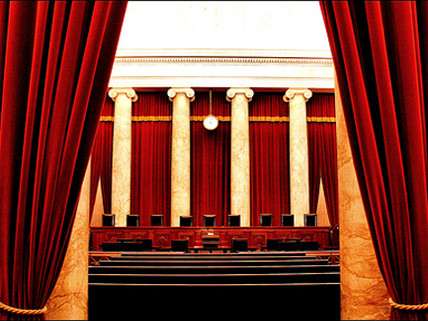Today at SCOTUS: Warrantless Drunk Driving Tests and the Fourth Amendment
Supreme Court weighs constitutional rights against law enforcement powers.

Today the U.S. Supreme Court will hear oral argument in three consolidated cases that pose the following question: "Whether, in the absence of a warrant, a State may make it a crime for a person to refuse to take a chemical test to detect the presence of alcohol in the person's blood."
At issue in the consolidated cases of Birchfield v. North Dakota, Beylund v. Levi, and Bernard v. Minnesota, are state laws from North Dakota and Minnesota that impose criminal penalties on suspected drunk drivers who refuse to submit to warrantless chemical DUI tests. According to North Dakota, the state has a legitimate interest in combatting drunk driving and that legitimate interest "far outweigh[s] the limited interference with an arrestee's right to require the police to secure a warrant before conducting the search. The right to demand that police secure a warrant here is at the periphery of the Fourth Amendment." Minnesota offers a related argument, telling the Court that its law "is constitutional as applied to breath tests because a warrantless breath test administered to a suspect lawfully arrested for drunk driving would be permissible pursuant to the search incident to arrest doctrine."
The arrested parties in these cases offer a different view. Danny Birchfield, for example, is a North Dakota man arrested on suspicion of drunk driving who refused to submit to a warrantless chemical test. He was charged for his refusal and sentenced under the refusal statute. Birchfield maintains that the state law imposed an unconstitutional condition upon him, forcing him to either sacrifice his constitutional right to be free from a warrantless search under the Fourth Amendment or else face criminal sanctions. Birchfield and his lawyers therefore urge the Supreme Court to reject "the extraordinary proposition that persons may be subjected to criminal penalties for asserting their constitutional right to resist a search that is not supported by a warrant or an exception to the warrant requirement."
William Bernard of Minnesota offers a related argument. In his case, he was arrested on suspicion of drunk driving, taken to the police station, and asked to submit to a breath test. He said no, thus triggering the state law criminalizing such refusals. The Minnesota Supreme Court eventually upheld the state law, arguing that the police may impose warrantless breath tests on suspects like Bernard incident to their arrests. Yet as Bernard and his lawyers point out, the classic justifications for the search incident to arrest doctrine center on officer safety and preventing the destruction of evidence. This stems from the idea that the police need to secure the scene for weapons and evidence and can't always wait around safely for a warrant before doing so. "Because a breath test is not administered to further officer safety or to preserve evidence," Bernard and his lawyers point out, "it is not a valid search incident to arrest."
Today's three consolidated cases therefore raise significant questions about both the scope of the Fourth Amendment and its impact on the use of aggressive law enforcement tactics.


Show Comments (73)